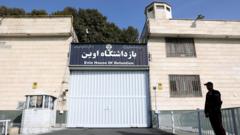**In an unprecedented series of missile strikes and attacks, Iran has announced a cease-fire with Israel following intense U.S. military involvement. Uncertainty looms as both nations continue hostilities.**
**Cease-Fire Announcement Amid Intensified Israel-Iran Conflict**

**Cease-Fire Announcement Amid Intensified Israel-Iran Conflict**
**Reports indicate a fragile cease-fire between Israel and Iran as missile exchanges escalate.**
In a dramatic turn of events, Iran's foreign minister announced a cease-fire with Israel early Tuesday after President Trump declared an extensive agreement to halt the ongoing hostilities. This announcement came amidst ongoing missile strikes exchanged between the two nations, raising questions about the feasibility of the proposed cease-fire.
The Iranian military had been in a state of heightened conflict, having engaged with Israel until the very last moment. Minister Abbas Araghchi confirmed on social media that the cease-fire took effect at 4 a.m. local time, but the Israeli government has not yet commented on the claims that hostilities had ceased. Despite the announcement, Israeli military sources indicated they would continue their response to Iranian missile launches, marking a potential continuation of the conflict even as cease-fire talks were initiated.
Tensions escalated rapidly after American bombers targeted Iranian nuclear facilities. Just hours after Trump's announcement, missile activity from Iran intensified, including attacks on U.S. military installations in the region. Vice President JD Vance framed the current state of affairs as an opportunity to “restart a real peace process,” while Trump characterized the situation as a chance for a “Complete and Total CEASEFIRE.”
The situation remains precarious as the promises of peace come despite ongoing military engagements. American officials reported that missiles fired from Iran targeted Al Udeid Air Base in Qatar, the largest U.S. military site in the Middle East, leading to concerns over the scope of the conflict. The Pentagon acknowledged that American air defenses intercepted most of the missiles without resulting casualties.
As the international community closely monitors the developments, economic indicators show a tumultuous shift; oil prices faced fluctuations given the volatility in the region. Calls for diplomacy emerged from various sectors, with the European Union’s chief diplomat expressing concerns over potential escalating violence unless a diplomatic resolution is sought.
Following these developments, both nations are still in a state of chaos, with uncertainties looming over the effectiveness of the cease-fire. Amidst this backdrop, Israel continues its military operations, while Iran’s leadership cautiously considers the implications of their latest retaliatory actions.
Reports suggest extensive diplomatic channels, including those led by Qatari officials, have sought to broker peace, but the path to stability remains fraught with challenges as immediate responses from both countries could further exacerbate tensions in the region.





















